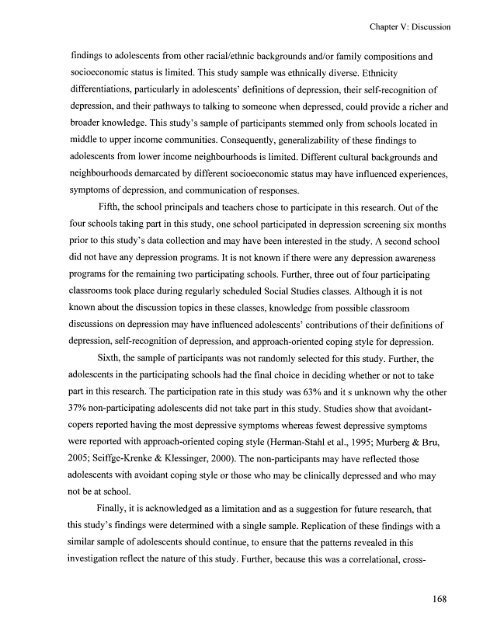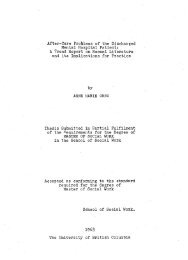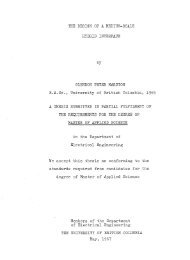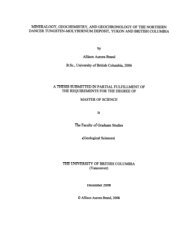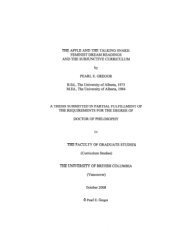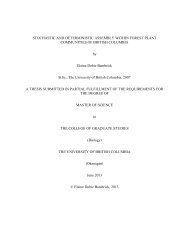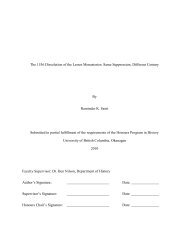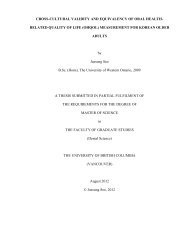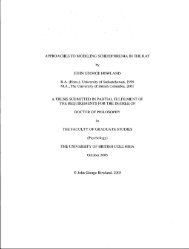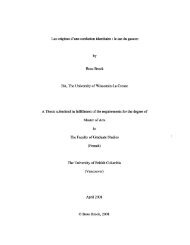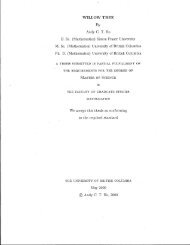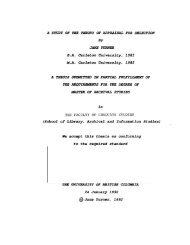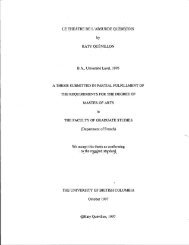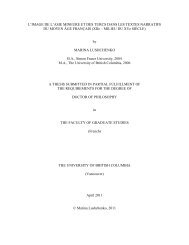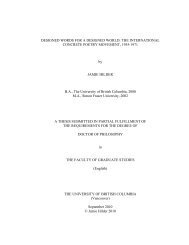how do adolescents define depression? - cIRcle - University of ...
how do adolescents define depression? - cIRcle - University of ...
how do adolescents define depression? - cIRcle - University of ...
Create successful ePaper yourself
Turn your PDF publications into a flip-book with our unique Google optimized e-Paper software.
Chapter V: Discussion<br />
findings to a<strong>do</strong>lescents from other racial/ethnic backgrounds and/or family compositions and<br />
socioeconomic status is limited. This study sample was ethnically diverse. Ethnicity<br />
differentiations, particularly in a<strong>do</strong>lescents' definitions <strong>of</strong> <strong>depression</strong>, their self-recognition <strong>of</strong><br />
<strong>depression</strong>, and their pathways to talking to someone when depressed, could provide a richer and<br />
broader knowledge. This study's sample <strong>of</strong> participants stemmed only from schools located in<br />
middle to upper income communities. Consequently, generalizability <strong>of</strong> these findings to<br />
a<strong>do</strong>lescents from lower income neighbourhoods is limited. Different cultural backgrounds and<br />
neighbourhoods demarcated by different socioeconomic status may have influenced experiences,<br />
symptoms <strong>of</strong> <strong>depression</strong>, and communication <strong>of</strong> responses.<br />
Fifth, the school principals and teachers chose to participate in this research. Out <strong>of</strong> the<br />
four schools taking part in this study, one school participated in <strong>depression</strong> screening six months<br />
prior to this study's data collection and may have been interested in the study. A second school<br />
did not have any <strong>depression</strong> programs. It is not known if there were any <strong>depression</strong> awareness<br />
programs for the remaining two participating schools. Further, three out <strong>of</strong> four participating<br />
classrooms took place during regularly scheduled Social Studies classes. Although it is not<br />
known about the discussion topics in these classes, knowledge from possible classroom<br />
discussions on <strong>depression</strong> may have influenced a<strong>do</strong>lescents' contributions <strong>of</strong> their definitions <strong>of</strong><br />
<strong>depression</strong>, self-recognition <strong>of</strong> <strong>depression</strong>, and approach-oriented coping style for <strong>depression</strong>.<br />
Sixth, the sample <strong>of</strong> participants was not ran<strong>do</strong>mly selected for this study. Further, the<br />
a<strong>do</strong>lescents in the participating schools had the final choice in deciding whether or not to take<br />
part in this research. The participation rate in this study was 63% and it s unknown why the other<br />
37% non-participating a<strong>do</strong>lescents did not take part in this study. Studies s<strong>how</strong> that avoidant-<br />
copers reported having the most depressive symptoms whereas fewest depressive symptoms<br />
were reported with approach-oriented coping style (Herman-Stahl et al., 1995; Murberg & Bru,<br />
2005; Seiffge-Krenke & Klessinger, 2000). The non-participants may have reflected those<br />
a<strong>do</strong>lescents with avoidant coping style or those who may be clinically depressed and who may<br />
not be at school.<br />
Finally, it is acknowledged as a limitation and as a suggestion for future research, that<br />
this study's findings were determined with a single sample. Replication <strong>of</strong> these findings with a<br />
similar sample <strong>of</strong> a<strong>do</strong>lescents should continue, to ensure that the patterns revealed in this<br />
investigation reflect the nature <strong>of</strong> this study. Further, because this was a correlational, cross-<br />
168


